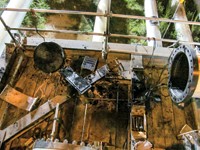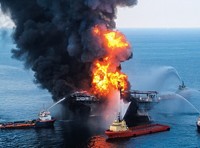Advertisement
Grab your lab coat. Let's get started
Welcome!
Welcome!
Create an account below to get 6 C&EN articles per month, receive newsletters and more - all free.
It seems this is your first time logging in online. Please enter the following information to continue.
As an ACS member you automatically get access to this site. All we need is few more details to create your reading experience.
Not you? Sign in with a different account.
Not you? Sign in with a different account.
ERROR 1
ERROR 1
ERROR 2
ERROR 2
ERROR 2
ERROR 2
ERROR 2
Password and Confirm password must match.
If you have an ACS member number, please enter it here so we can link this account to your membership. (optional)
ERROR 2
ACS values your privacy. By submitting your information, you are gaining access to C&EN and subscribing to our weekly newsletter. We use the information you provide to make your reading experience better, and we will never sell your data to third party members.
Safety
Oil Rig Probe Questioned
BP Accident: Chemical safety board says government is relying too much on industry
by Jeff Johnson
January 3, 2011
| A version of this story appeared in
Volume 89, Issue 1

A government-led probe of a key aspect of the BP Deepwater Horizon oil rig disaster last April is being compromised because it depends too heavily on firms that have a direct stake in its outcome, the Chemical Safety & Hazard Investigation Board (CSB) charges in a Dec. 23, 2010, letter to officials at the Department of the Interior, one of two federal agencies leading the investigation. The probe centers on the rig’s blowout preventer, the failure of which led to the fatal explosion and resulting environmental catastrophe.
The government’s reliance on firms involved in the accident weakens the investigation and “jeopardizes the public’s trust in the examination results,” the board warns in the letter to Michael R. Bromwich, a bureau director at Interior. The letter is one of several exchanges between CSB and Interior obtained by C&EN.
To avoid this conflict of interest, CSB is urging a halt to the forensic investigation of the blowout preventer that has been under way since November 2010. The board says the investigation should not resume until a neutral third party can be appointed to provide oversight.
Last summer, members of Congress asked CSB, an independent federal agency, to conduct a separate probe of the cause of the oil rig explosion because of the board’s experience investigating other BP industrial accidents. The board’s probe necessarily requires examination of the blowout preventer because of its key role in the accident.
A government team composed of Interior and Coast Guard officials is directing the blowout preventer investigation. That team has selected Det Norske Veritas (DNV), a Norwegian engineering firm, to design and oversee the protocol for the investigation. The protocol that DNV devised allows physical inspection of the blowout preventer by employees of Transocean, which operated the drilling rig, and Cameron, which manufactured the equipment. DNV itself has close ties to the accident because it was a consultant to BP and Transocean and audited the rig’s safety in 2007.
The protocol allows only six witnesses to observe the actual forensic examination: BP, Transocean, Cameron, CSB, the Department of Justice, and a representative for plaintiffs litigating over the accident. CSB charges that DNV has turned to Cameron and Transocean employees for hands-on examination of the blowout preventer at times when access by CSB’s own investigators was denied.
In its letter to Interior, CSB notes that Cameron and Transocean are subjects of federal civil complaints and a criminal investigation, and thus they have a direct stake in the outcome of the blowout preventer examination’s report, which is expected in March.
CSB also objects to limits on its access to photographic records and results of metallurgical and hydraulic tests conducted on the blowout preventer. The board has faced similar access limits during other accident investigations, but those restrictions came primarily from chemical and oil companies and state and city officials, not federal regulators.
These objections are evident in an exchange of letters between CSB and Interior over the past few weeks and continue tensions dating back to November 2010, when the parties reached an interim agreement for access to materials (C&EN Online Latest News, Nov. 16, 2010).
Interior is preparing a response to CSB’s Dec. 23 letter, says department spokesman T. David Smith. In a statement, Smith says the companies have been permitted to provide technical expertise “for the sole purpose of answering any technical questions the DNV personnel performing the examination may have. Representatives from these companies are observers only and are not involved in the examination.”




Join the conversation
Contact the reporter
Submit a Letter to the Editor for publication
Engage with us on Twitter